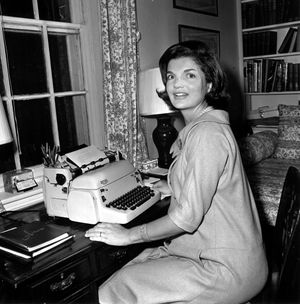The public’s right to “no”
Jackie Kennedy wrote letters to a priest years ago and now the letters may be auctioned off to a highest bidder? Is nothing sacred? Apparently not.
Just like attorney-client privilege, a priest has the moral responsibility not to divulge the conversations a person has with him. If a person seeks advice or confesses misdeeds or simply confides in him - no matter if the conversation happens under the known “Seal of Confession” or not - the words are sacred and private.
Making money from Jackie Kennedy’s personal communication with a priest suggests a profound lack of character on the part of the sellers as well as the priest who saved the letters.
Sometimes the right to know means "no!" to writings.
(S-R archive photo: In this Oct. 5, 1960 AP file photo, Jacqueline Kennedy poses at her typewriter.)
